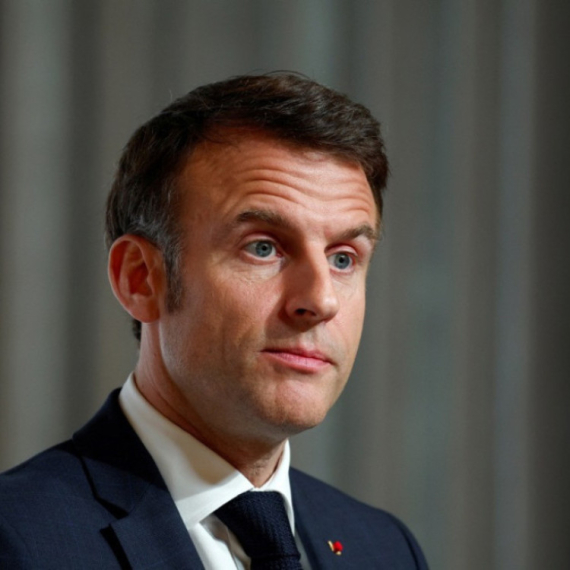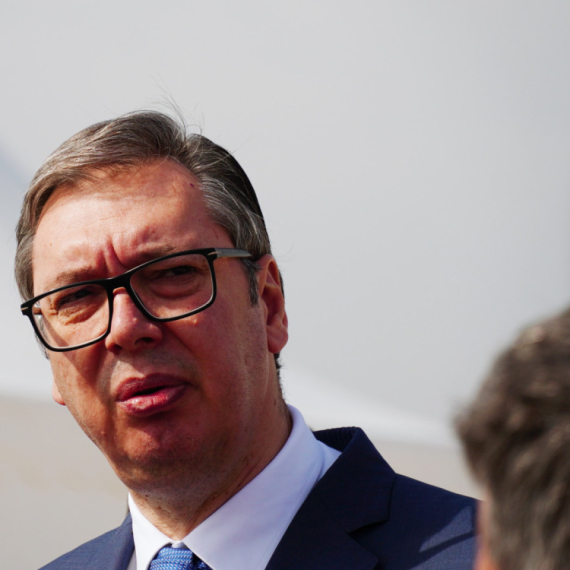Thaci: Kosovo's position respected
Hashim Thaci believes that a joint <a href="http://www.b92.net/eng/news/politics-article.php?yyyy=2008&mm=11&dd=27&nav_id=55328" class="text-link" target= "_blank">presidential statement by the UN Security Counci</a>l earlier this week respects the position of the Kosovo institutions.
Saturday, 29.11.2008.
13:32

Hashim Thaci believes that a joint presidential statement by the UN Security Council earlier this week respects the position of the Kosovo institutions. "We have given our full support to EULEX's mandate that was determined by the European Union. EULEX was invited by our institutions. At the same time we have categorically rejected the six points," the Kosovo Albanian premier said of the plan agreed on by Belgrade and the UN. Thaci: Kosovo's position respected "Under no circumstances will the six points envisaged in Belgrade be tolerated by either domestic of international institutions and they will not bring into question the sovereignty and territorial integrity of Kosovo," he told Pristina daily Express, according to Beta news agency. In Belgrade meantime, top officials are saying that the six points, that provide for Serbia's sovereignty and territorial integrity, have in fact made their way to the presidential statement, which determines the reconfiguration of UNMIK and deployment of EULEX. In Pristina, Thaci said that the international representatives in Kosovo have a clear position – "an active start of realization of state and international functions in the whole territory of Kosovo". "That means that we have a process of UNMIK's departure, realization of legality by EULEX and Kosovo institutions in the north. That is why this is very important, as well as the exceptional support of the U.S., EU and NATO to the institutions and the people of Kosovo, to our efforts toward peace, stability, regional cooperation and integration perspective," he said. Asked how it was possible to support EULEX, at the same time rejecting the UN plan, Thaci said that EULEX has "a complete EU mandate", that it was invited by the Kosovo institutions, and that it is "logical that now Pristina supports and cooperates with the EU mission". When the newspaper's reporter remarked that Kosovo assembly deputies and political parties believe that Pristina's rejection was "soft", he said it was "the state and people's no, a two-million no". He also rejected calls for him and Kosovo President Fatmir Sejdiu to resign over the latest developments, saying that "Kosovo is achieving historic successes", which gives its leaders "all the more responsibility and motive to continue with the good work". Speaking about the cooperation with UNMIK, he said the UN mission is "in an unreasonable situation when it is not needed by Kosovo", according to Beta. "Resolution 1244 is also an obsolete document after the declaration of independence of Kosovo. Kosovo has a constitution, President Martti Ahtisaari's document, which we will continue to fully respect," said Thaci. He added that all the proposals made by UN Secretary-General Ban Ki-moon in the six-point plan have been "adequately solved" in the Ahtisaari document, and that Kosovo's institution will only respect the latter. Yesterday in Pristina, Fatmir Sejdiu that the EULEX mission in Kosovo should be established as soon as possible, based on "the Kosovo constitution and other documents". "According to our stands presented earlier, one should have in mind Ahtisaari's project, the Kosovo constitution, declaration of independence, joint plan of action of February 4, 2008, as well as the invitation I have forwarded to the EU on behalf of the Kosovo institutions for deployment of EULEX,” Sejdiu said after his meeting with head of the Socialist Party of Albania Edi Rama in Pristina. He underscored that Kosovo's institutions urge for deployment of EULEX in the whole of the territory of Kosovo at the same time, opposing dual mandate of international missions. “There may not be two international mandates in Kosovo, one for the Albanians and another for the Serbs,” said Sejdiu, adding that EULEX may not be status neutral if it comprises of staff from countries that had recognized independence of Kosovo. "Only the states that have not recognized Kosovo's independence so far may express their status neutrality, although there are countries among them that have recognized passports and other documents, which, in a way is recognition of a new reality in Kosovo,” said Sejdiu. Meanwhile, leader of the Social Democratic Party of Kosovo and former Premier Agim Ceku on Friday stated that the six-point plan is a “step backwards” and that no one had benefited from it. “The plan is a step backwards for Kosovo, UNMIK, the Kosovo Serbs and Belgrade,” Ceku said at a meeting in the Media Center in Caglavica. Ceku believes that the international community's present approach to Kosovo is the same as that prior to making the decision on the status, that consolidation of the Kosovo institutions was put back with the Security Council decision and that the Kosovo Serbs are still distanced from Pristina and the majority population in Kosovo. “The plan caused confusion, doubts, lack of trust. I expect EULEX to bring the Kosovo Serbs closer to Pristina instead of Belgrade,” Ceku said. He also said that it is up to the Kosovo government to decide on the way in which to resolve the newly created situation, that it should find a solution that would lead forward and that one of the steps should imply "drafting of a plan to integrate the Serbs in Kosovo". At the same meeting, Slavisa Petkovic, Kosovo assembly member and leader of the Serbian Democratic Party of Kosovo, accused the Kosovo government and parliament of alienating Serbs from the Pristina institutions. “The Kosovo Serbs have nothing from the Kosovo institutions and if it were not for the Serbian government and its assistance, they would never survive in Kosovo,” said Petkovic.
Thaci: Kosovo's position respected
"Under no circumstances will the six points envisaged in Belgrade be tolerated by either domestic of international institutions and they will not bring into question the sovereignty and territorial integrity of Kosovo," he told Priština daily Express, according to Beta news agency.In Belgrade meantime, top officials are saying that the six points, that provide for Serbia's sovereignty and territorial integrity, have in fact made their way to the presidential statement, which determines the reconfiguration of UNMIK and deployment of EULEX.
In Priština, Thaci said that the international representatives in Kosovo have a clear position – "an active start of realization of state and international functions in the whole territory of Kosovo".
"That means that we have a process of UNMIK's departure, realization of legality by EULEX and Kosovo institutions in the north. That is why this is very important, as well as the exceptional support of the U.S., EU and NATO to the institutions and the people of Kosovo, to our efforts toward peace, stability, regional cooperation and integration perspective," he said.
Asked how it was possible to support EULEX, at the same time rejecting the UN plan, Thaci said that EULEX has "a complete EU mandate", that it was invited by the Kosovo institutions, and that it is "logical that now Priština supports and cooperates with the EU mission".
When the newspaper's reporter remarked that Kosovo assembly deputies and political parties believe that Priština's rejection was "soft", he said it was "the state and people's no, a two-million no".
He also rejected calls for him and Kosovo President Fatmir Sejdiu to resign over the latest developments, saying that "Kosovo is achieving historic successes", which gives its leaders "all the more responsibility and motive to continue with the good work".
Speaking about the cooperation with UNMIK, he said the UN mission is "in an unreasonable situation when it is not needed by Kosovo", according to Beta.
"Resolution 1244 is also an obsolete document after the declaration of independence of Kosovo. Kosovo has a constitution, President Martti Ahtisaari's document, which we will continue to fully respect," said Thaci.
He added that all the proposals made by UN Secretary-General Ban Ki-moon in the six-point plan have been "adequately solved" in the Ahtisaari document, and that Kosovo's institution will only respect the latter.
Yesterday in Priština, Fatmir Sejdiu that the EULEX mission in Kosovo should be established as soon as possible, based on "the Kosovo constitution and other documents".
"According to our stands presented earlier, one should have in mind Ahtisaari's project, the Kosovo constitution, declaration of independence, joint plan of action of February 4, 2008, as well as the invitation I have forwarded to the EU on behalf of the Kosovo institutions for deployment of EULEX,” Sejdiu said after his meeting with head of the Socialist Party of Albania Edi Rama in Priština.
He underscored that Kosovo's institutions urge for deployment of EULEX in the whole of the territory of Kosovo at the same time, opposing dual mandate of international missions.
“There may not be two international mandates in Kosovo, one for the Albanians and another for the Serbs,” said Sejdiu, adding that EULEX may not be status neutral if it comprises of staff from countries that had recognized independence of Kosovo.
"Only the states that have not recognized Kosovo's independence so far may express their status neutrality, although there are countries among them that have recognized passports and other documents, which, in a way is recognition of a new reality in Kosovo,” said Sejdiu.
Meanwhile, leader of the Social Democratic Party of Kosovo and former Premier Agim Ceku on Friday stated that the six-point plan is a “step backwards” and that no one had benefited from it.
“The plan is a step backwards for Kosovo, UNMIK, the Kosovo Serbs and Belgrade,” Ceku said at a meeting in the Media Center in Čaglavica.
Ceku believes that the international community's present approach to Kosovo is the same as that prior to making the decision on the status, that consolidation of the Kosovo institutions was put back with the Security Council decision and that the Kosovo Serbs are still distanced from Priština and the majority population in Kosovo.
“The plan caused confusion, doubts, lack of trust. I expect EULEX to bring the Kosovo Serbs closer to Priština instead of Belgrade,” Ceku said.
He also said that it is up to the Kosovo government to decide on the way in which to resolve the newly created situation, that it should find a solution that would lead forward and that one of the steps should imply "drafting of a plan to integrate the Serbs in Kosovo".
At the same meeting, Slaviša Petković, Kosovo assembly member and leader of the Serbian Democratic Party of Kosovo, accused the Kosovo government and parliament of alienating Serbs from the Priština institutions.
“The Kosovo Serbs have nothing from the Kosovo institutions and if it were not for the Serbian government and its assistance, they would never survive in Kosovo,” said Petković.


























































Komentari 12
Pogledaj komentare